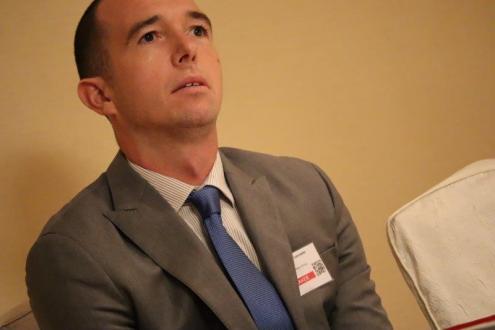UK Private Client Tax Issues and the Asian HNWI – An Analysis and Update

Laurence Lancaster of The Sovereign Group
Jan 6, 2019
A Workshop at the Hubbis Indonesia Wealth Management Forum provided the assembled wealth management experts with serious food for thought in relation to a suite of UK legislative changes that might have major ramifications for Asia’s wealthy if they have property, business or other connections to the UK. In short, the message was ‘caveat emptor’, or in lay terms ‘Watch out’!
Owen opened the Workshop by introducing himself as an ex-lawyer with 22 years of experience in the corporate crime and regulatory legal practice in the UK and explaining why he and Lancaster were there in Jakarta.
“We are here,” he said, “to highlight the ramifications for wealth managers and the wealth industry globally of the UK Criminal Finances Act (The Act), which has introduced two new laws to crack down further on tax evasion. The first target of this investigation, which emerged just recently, is an individual from Azerbaijan, a case that you might have heard about and that has major ramifications.”
Acting on The Act
The Act came into full force from 30 September 2017 and focuses on two new corporate tax evasion offences, one related to UK tax and the other to overseas tax. “Why it is relevant to you here in Indonesia,” reported Owen, “is because it impacts businesses based both in and outside of the UK; it applies to UK and non-UK companies, and it relates to both UK and non-UK tax evasion.”
The targets, he explained, are those particularly who deal with companies in offshore jurisdictions, tax havens, or secrecy havens. “So, all of you who get involved with offshore structures must consider carefully your own internal procedures to deal with this potential risk for you, your business and your clients.”
He explained that to address these concerns Hubbis offers a relevant learning course and HM Revenue and Customs in the UK has also issued guidance. "The most relevant concern to this audience relates to a failure of a relevant corporate body to prevent the facilitation of non-UK tax evasion,” he elucidated. “This could mean tax evasion from an Indonesian resident, by a Singaporean, by a Malaysian, by a Papua New Guinean, anyone.”
The net is widening and fewer loopholes exist
Mining further into the fine print, Owen explained that The Act introduced two new corporate offences. The first is the failure of a relevant corporate body to prevent the facilitation of UK tax evasion by an associated person, (the UK tax evasion offence for short). The second is the failure of a relevant corporate body to prevent the facilitation of non-UK tax evasion by an associated person (the foreign tax evasion offence).
The foreign tax evasion offence will catch UK companies, and also non-UK companies if the non-UK company carries on business in the UK, or some or all of the facilitation happens in the UK.
Wealth advisers and clients beware
“With the foreign tax evasion offence,” said Owen, “it does not require UK tax evasion, and therefore could affect anyone giving bespoke financial advice or tax advice. The guidance makes it clear that higher risk business lines will be those involved in giving bespoke financial advice or tax advice.”
Owen further elucidated that the UK tax evasion offence is split into three stages: criminal evasion of UK tax by the taxpayer; criminal facilitation of the tax evasion by an “associated person” of the relevant body who is acting in that capacity; and failure by the relevant body to prevent that facilitation. “It is vital that businesses understand that this is a strict liability offence for the business for the actions of associated persons regardless of knowledge or intention,” Owen concluded.
Addressing a question from the audience as to why the UK’s reach should extend so far, Owen explained that an associated person for the purposes of the offence is an employee, an agent, anyone connected overseas, anyone an adviser or client might use in an offshore center. “Especially if there is a UK entity connected to a person, that represents the most danger in this case. If caught, penalties include brand reputation damage, unlimited fines, bans on bidding for public contracts, and other possible sanctions might arise,” he noted. “You have to put procedures in place that show you have taken reasonable prevention procedures. That will be the basis of any defence for your business to these new offences.”
Explaining the inexplicable?
Owen also noted that the UK’s new Unexplained Wealth Orders law came into effect on 30 January and is a further tool that allows enforcement agencies in the UK to investigate when they suspect that an individual has more than £50,000 worth of assets which they consider to be unexplained. “For example, an individual based in Indonesia, with property and other assets in the UK, cannot ignore complying with an unexplained wealth order, or they might risk and/or losing those UK assets.”
“In the past, people in this region have gone out of their way to keep trust structures secret, but that is no longer an option. If served with an unexplained wealth order they will now have to explain how they made the money that funded the purchase of the asset. An example of someone who might become a legitimate target to be served with such an order would be an overseas government official earning a modest salary in his country but has a GBP20 million house in Mayfair in London. On the face of it there may not be an obvious explanation of how he or she could afford property of this value. The Order could be served in order to get details of how this was funded. If the individual fails to adequately explain how they came by that money, the risk is confiscation of the asset.” If they fail to properly explain the source of the funds they may also find themselves subject to a money laundering investigation.
Owen also highlighted an online course on the Hubbis learning platform which will help banks and other wealth firms improve their staff’s understanding of these and other new regulations, which could greatly affect their businesses and their clients.
Transparency – now a norm, and longer an option
“All this goes to the heart of transparency," Owen commented. "Whether we like it or not, there is a new drive globally towards transparency, perhaps evidenced by public, rather than private, beneficial ownership registers, FATCA, CRS, Automatic Exchange of Information. This is the new transparent world and all our clients have to live with it, whether they like it or not. And remember that the financial intermediaries involved can easily find themselves caught up in these new UK investigations which are remarkably invasive and extra-territorial in their scope.
Laurence Lancaster, Barrister-at-law and Group Head of Tax for Sovereign Group, then took the floor. “We are an international trust company,” he remarked, introducing himself. “It is interesting that the UK has essentially shifted from the basic principle of innocent until proven guilty to guilty until proven innocent in the domain of tax, which is a concern. They have targeted this area of tax evasion and aggressive tax avoidance as well as tax non-compliance, so they have actually conflated tax evasion with tax avoidance, which is quite interesting because the two are very conceptually different, one is legal avoidance, the other is illegal evasion.”
To avoid, or to evade?
The distinction, he observed, is that an individual’s or a company’s affairs can be organised in such a way to minimise tax, i.e tax avoidance, while hiding money or assets is tax evasion, potentially. “It is a guilty state of mind that distinguishes the two,” he noted.
Lancaster explained that his portion of the Workshop was to address the failure to correct offshore tax noncompliance, for which ‘D-Day’ was the 30th September 2018. “Failure to correct penalties are up to 250% of the imputed income tax, capital gains tax or inheritance tax due. So, for example, an offshore trustee who set up trusts for an expat who may or may not be UK domiciled may suddenly find that they are exposed. If someone, for example, set up a trust for a client and incorrectly reported the income on the tax return that person might then become liable for the tax that the client or the trust has not paid."
Get good advice…now!
Lancaster then explained that he strongly advises advisers to caution their clients to obtain tax advice. “If a client obtains suitable tax advice then that should mean that he is within the domain of avoidance, not evasion.”
Lancaster cited an example, with special reference to the General Anti-Abuse Rule (GAAR), and the disclosure of tax avoidance schemes. “Mr X is non-resident and receives UK property income from a tenant without tax being deducted at source. If he does not report that income in his tax return, this is a crime of evasion and would now be subject not only to the tax on that income but to 250% penalties as well. Mrs Y is a UK resident and has overseas consultancy income paid into a BVI shell company, that is tax evasion, a crime.”
“On the other hand,” he added, “Mr Z is non-domiciled and non-resident, for example, one of your Indonesian clients who purchases a UK residential property through a genuine pension arrangement, which benefits from an inheritance tax exemption, and with full tax advice obtained from a qualified adviser. This planning is perfectly legitimate but without the tax advice it could be susceptible to an HMRC challenge.”
No stamp of approval from HMRC
Lancaster also focused on stamp duty for foreign purchasers of UK property. “Back in 2012, we had a 15% stamp duty rate that was introduced for companies, which was soon tempered by an exemption that allows for property let out to a third party being exempt from this 15%. However, the new Annual Tax on Enveloped Dwellings has since extended capital gains tax to all non-residents, companies, trustees, and partnerships. Then in April 2016, we saw the 3% surcharge that applies to anyone who has purchased a UK property that is not their only property around the world.”
Additionally, Lancaster reported that anyone who is non-domiciled but who buys UK residential property through an arrangement such as a company or a trust will in most instances now be subject to inheritance tax. “But there are legal structures to bypass this requirement,” he explained, “so you need to obtain the best possible advice on the most appropriate structures through which to legally mitigate your tax obligations.”
Act smart, act fast
The important thing to understand, Lancaster expounded, is not the suite of possible solutions, but that the advisory community and their clients must consider these matters and act appropriately. "Moreover, anyone with existing structures in place is likely to now be caught up in these tax implications because of the changes in the past six years," he explained. "So, for example, all the non-resident, non-domiciles who have existing BVI structures or Jersey structures holding properties, they are likely to now be within the net.”
To conclude, Lancaster said that the advice he gives to clients now is that it is probably best for investors to buy on their own names henceforth where the property is for personal use; an overseas trust may still be used in certain cases. But in terms of investment structures there are still some advantages to using a company. “It is complex and requires careful research, advice and planning,” he concluded. “To not do so is risky and I strongly advise that caution is the best way forward.”

Barrister-at-law, Group Head of Tax at The Sovereign Group

More from Laurence Lancaster, The Sovereign Group
Latest Articles






